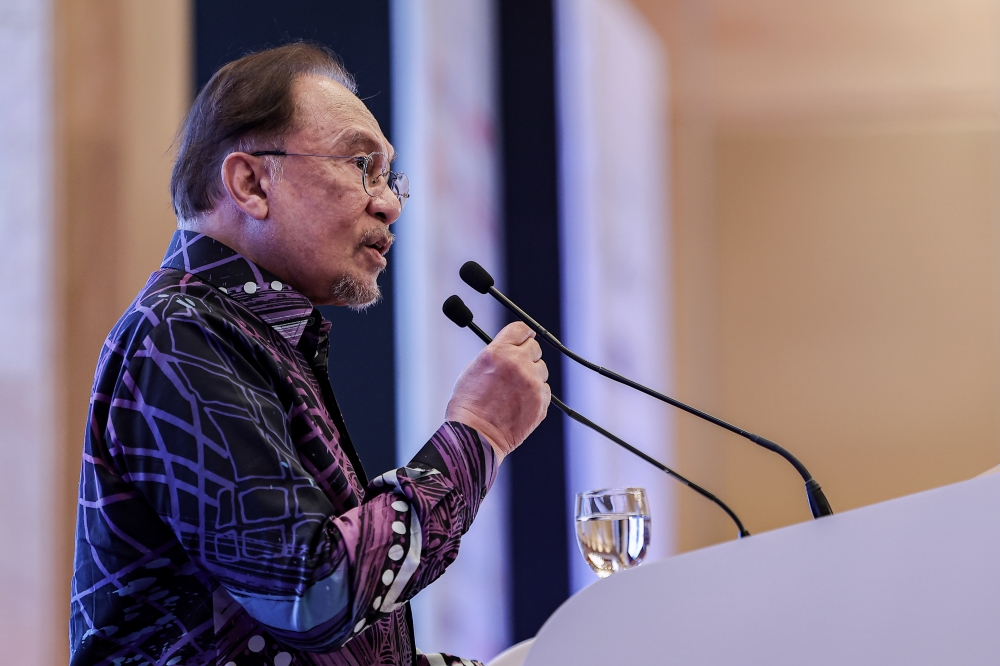AUGUST 12 — In “If Anwar’s constitutional questions are preposterous, absurd and legal nonsense, let the court say it” I wrote that if the constitutional questions proposed to be referred by Prime Minister Anwar Ibrahim for a ruling by the Federal Court were preposterous, absurd and legal nonsense, let the court having the ultimate authority say it.
The constitutional questions were

It was submitted by Datuk Seri Anwar Ibrahim that he was being selectively exposed to litigation in a manner that violates the principle of equal protection, implying that the Prime Minister should receive distinct treatment under the law. — Bernama pic
proposed in the civil action commenced by Yusoff Rawther against Anwar in the latter’s personal capacity.
The civil action was up for trial — the action having been filed at the High Court in July 2021, prior to Anwar’s appointment as the Prime Minister in November 2022 with the trial having been fixed on June 6, 2025 — but Anwar, by an application on May 23, 2025, sought to:
a) refer constitutional questions to the Federal Court (see below) – touching on whether a sitting Prime Minister enjoys certain immunities or protections from civil litigation relating to pre-office conduct — under O 92 r 4 of the Rules of Court 2012 (ROC) and/or Article 128(2) of the Federal Constitution and/or Section 84 of the Courts of Judicature Act 1964 (CJA); and
b) stay the trial on June 16 pending the Federal Court’s determination of those constitutional questions.
At the hearing of the application, it was submitted by Anwar’s legal team that the continuation of the civil action engages constitutional issues concerning the interpretation and effect of Articles 5, 8, 39, 40, and 43 of the Federal Constitution.
It was further suggested that a sitting Prime Minister should be insulated from the burdens of civil litigation, and that the High Court ought to refer these issues for the determination of the Federal Court pursuant to Article 128(2) of the Federal Constitution.
Eight questions were listed in the application for referral to the Federal Court. The grounds that were said to be critical constitutional issues were namely:
a) Article 5(1) of the Federal Constitution — right to life and personal liberty:
It was contended by Anwar that being subjected to a civil trial while holding the office of Prime Minister infringes his liberty interests under Article 5(1), on the basis that it imposes undue burden and distraction from the discharge of executive functions;
b) Article 8(1) of the Federal Constitution — equality before the law:
It was submitted by Anwar that he was being selectively exposed to litigation in a manner that violates the principle of equal protection, implying that the Prime Minister should receive distinct treatment under the law;
c) Articles 39, 40, and 43 of the Federal Constitution — Executive authority, Yang di-Pertuan Agong to act on advice, and Cabinet:
It was argued that the above provisions collectively vest the executive authority of the Federation in the Yang di-Pertuan Agong acting on Cabinet advice, with the Prime Minister at its helm, and that subjecting the Prime Minister to civil litigation while in office undermines or disrupts this constitutional structure;
d) doctrine of ‘constructive harm’:
Anwar’s counsel introduced this idea — though not anchored on any express constitutional provision, that permitting a Prime Minister to be sued while in office causes ‘constructive harm’ to the institution of the Executive, and this ‘harm’ triggered constitutional protection; and
e) institutional proportionality:
It was argued that the adjudication of politically sensitive private tort claims against the sitting Prime Minister, in the absence of a constitutional scrutiny threshold, violated the principle of institutional proportionality and offended the basic structure of the Federal Constitution by upsetting the functional balance between the Judiciary and the Executive.
The application was made notwithstanding that Anwar was ready and willing to proceed with the trial.
Anwar does not assert that the action impairs his ability to perform his constitutional functions. He does not also produce any evidence to that effect.
It appears that Anwar does not raise immunity as a defence to Yusoff’s claim — but I stand corrected on this.
What is apparent, however, the application and the grounds are largely exploratory in nature – to test whether the Federal Constitution accords the Prime Minister any form of procedural immunity or protection from civil liability while in office.
One may not agree with the proposed constitutional questions — some, even from the legal fraternity, have vilified Anwar and his legal team for the questions — but it was ingenious of Anwar’s legal team to have proposed the questions — again, one may not agree with the word ‘ingenious’.
Be that as it may, High Court Judge Roz Mawar did not buy into Anwar’s legal team’s arguments, contentions and submissions.
After assessing the application and each of the grounds at length, the learned judge said:
“Having considered the application in its entirety, this court is of the view that the constitutional questions framed by the defendant are not real, substantial, or necessary for the disposal of the present suit. The issues raised do not call for the interpretation of any ambiguity in our Federal Constitution, nor do they relate to the validity of any legislation, or the scope of legislative competence under Article 128(2) of our Federal Constitution.
“The principles [are] … clear: that not every question which touches on the Constitution qualifies for referral under Section 84 of the CJA. This court must be satisfied that the constitutional question is both genuine and material to the resolution of the case. The Federal Court is not a forum for speculative or defensive advisory opinions.
“This present application discloses no such question. The suit concerns a personal claim against the defendant for alleged acts occurring prior to his assumption of office. There is no suggestion that the defendant is unable to discharge his constitutional duties, and the defendant has indicated readiness to proceed with trial as scheduled on 16 June 2025. It is this court’s considered conclusion that Section 84 of the CJA is not satisfied. This court therefore declines to refer the proposed questions to the Federal Court.
“The application … is hereby dismissed. Cost of RM20,000 is awarded to the plaintiff. Trial to commence on 16 June 2025 as scheduled.” (See Muhammed Yusoff Rawther v Dato’ Seri Anwar bin Ibrahim [2025] 10 MLJ 689, 690)
So, instead of vilifying Anwar’s so-called claim of immunity, which may be misplaced – unless Anwar pleads as such in his defence – let’s celebrate the learned High Court judge’s independence.
Her Ladyship decided against Anwar, who may be sued in his personal capacity, but nonetheless the country’s prime minister.
Anwar has appealed against the decision and has successfully obtained a stay of the trial pending the outcome of his appeal to the Court of Appeal.
Let Anwar’s application and its grounds be ventilated in the higher court. Let the application take its legal course.
* This is the personal opinion of the writer or publication and does not necessarily represent the views of Malay Mail.






